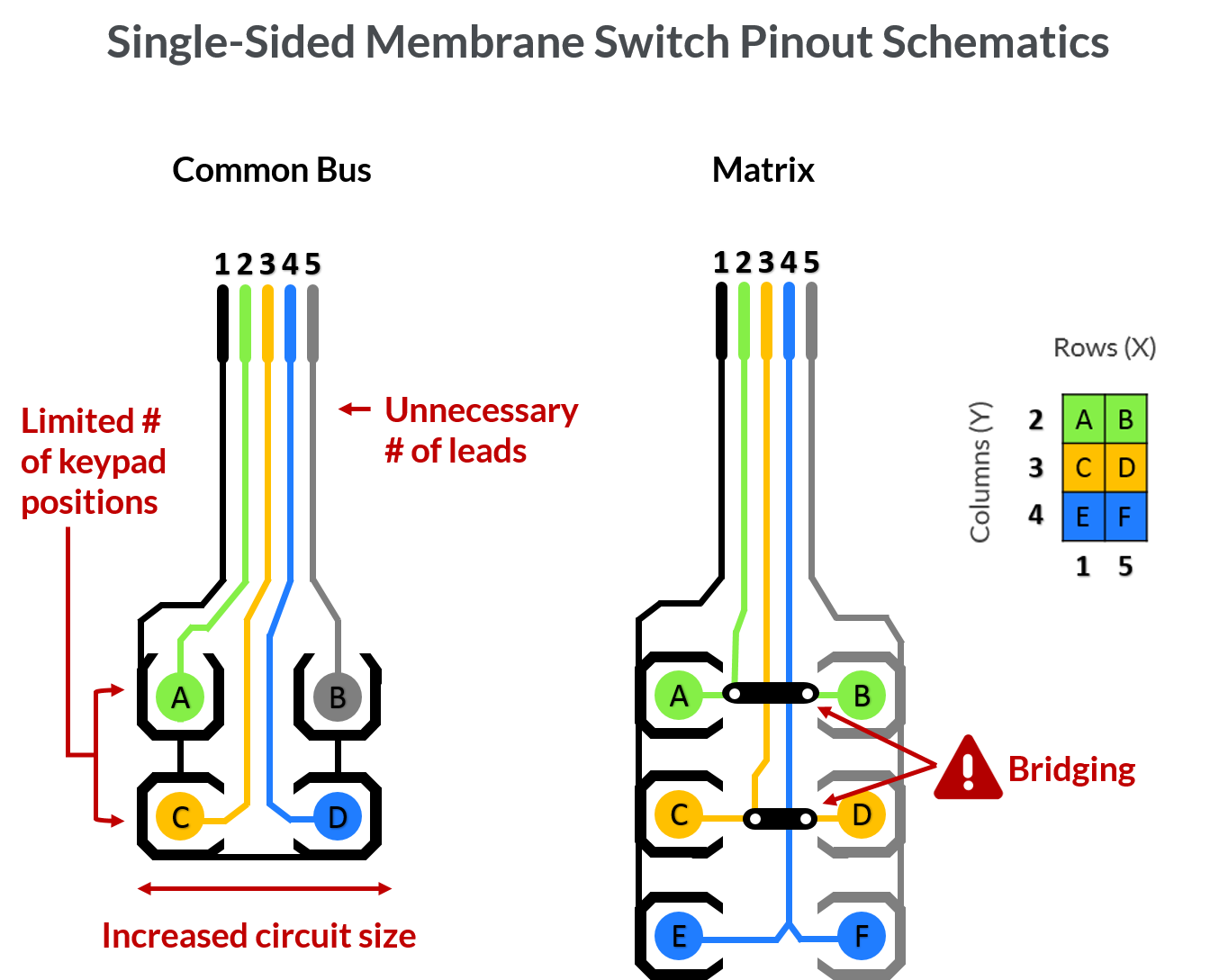Exactly How Membrane Switch Technology Functions and Its Function in Interface Style
Membrane switch modern technology is an advanced method that incorporates split products for touch-sensitive input. When pushed, its layout consists of graphic overlays, conductive layers, and adhesive parts that engage. This interaction not just completes an electric circuit however also affects the total individual experience. Understanding the ins and outs of this innovation discloses its substantial influence on customer interface layout, provoking questions regarding its applications and future growths in various industries.
Understanding Membrane Switch Innovation
Membrane switch modern technology offers as a crucial element in modern interface layout. This modern technology integrates graphic overlays, touch-sensitive membrane layers, and circuit layers to produce a small, reliable input technique for numerous tools. The layout typically consists of multiple layers, including a printed visuals layer that allows users to communicate with the gadget with tactile feedback. Membrane switches are understood for their sturdiness, resistance to moisture, and ease of cleansing, making them appropriate for atmospheres where standard mechanical buttons may stop working. Their low-profile style allows seamless integration right into devices, adding to a sleek look. Additionally, Membrane switches can be customized with various colors, structures, and signs, boosting user experience and aesthetic allure. This flexibility makes them prominent in consumer electronic devices, medical devices, and industrial controls, where instinctive communication is necessary. In general, Membrane switch modern technology stands for a substantial development in just how customers engage with electronic user interfaces.
Key Parts of Membrane Changes
Membrane switches over contain numerous vital elements that contribute to their capability and design. The conductive layer products, glue and assistance layers, and graphic overlay layout each play an important duty in making certain suitable efficiency and customer interaction. Comprehending these components is crucial for efficient interface design.
Conductive Layer Materials
Conductive layer materials play a necessary duty in the performance and integrity of Membrane switches. When pressure is used to the button, these materials are accountable for completing electrical circuits. Commonly, a mix of conductive inks, such as silver or carbon, is made use of to develop these layers. Silver conductive ink is favored for its exceptional conductivity and resilience, while carbon ink is often utilized for affordable applications. The selection of material influences not only the electrical efficiency however also the general lifespan of the switch. In addition, the thickness and make-up of conductive layers can affect responsive responses and switch actuation. Selecting the suitable conductive material is essential for guaranteeing excellent performance in varied interface applications.
Sticky and Support Layers
Sticky and assistance layers are crucial parts that add to the architectural honesty and performance of Membrane switches. These layers supply a durable structure, making certain that the different aspects of the Membrane button continue to be securely bonded and appropriately straightened throughout their functional life. The glue layer promotes the attachment of the button to the underlying surface, providing toughness against ecological aspects such as wetness, temperature level variations, and mechanical tension. Assistance layers boost the button's strength, protecting against deformation throughout usage and contributing to a constant responsive reaction. Together, these parts play an essential duty in maintaining the efficiency and long life of Membrane switches, ultimately affecting the overall user experience in user interface layout.
Graphic Overlay Style
Often neglected, visuals overlay style plays a crucial duty in the performance and looks of Membrane switches. This layout largely offers as the user interface in between the individual and the electronic devices, offering both aesthetic allure and operational clarity. Efficient graphic overlays use color, typography, and symbols to guide users in steering controls and understanding tool features. Furthermore, the option of materials impacts durability and tactile comments, guaranteeing the overlay endures wear while preserving an enjoyable customer experience. Furthermore, exact alignment of the overlay with the underlying parts is crucial for excellent performance. In final thought, thoughtful visuals overlay design improves usability, contributes to brand identification, and eventually affects user fulfillment in devices utilizing Membrane button technology.
The Production Refine of Membrane Changes
The manufacturing procedure of Membrane switches includes a number of essential actions that ensure performance and sturdiness. Initially, a graphic overlay is developed, integrating interface aspects and branding. This overlay is published onto an adaptable substratum, usually polyester or polycarbonate, making use of accuracy printing methods to determine quality and shade accuracy.Next, glue layers are used, followed by the integration of conductive traces, typically made from silver or carbon, which are vital for electric connectivity. These traces are etched or screen-printed onto a separate layer. After this, a spacer layer is contributed to produce the necessary space in between the overlay and the circuit layer, enabling tactile comments when activated.Finally, the parts are put together and examined for quality guarantee, ensuring that each Membrane button fulfills the needed specifications for performance and integrity. This careful procedure leads to a durable item fit for different applications in individual interface style.
Advantages of Making Use Of Membrane Changes

Membrane switches over deal various benefits that make them a preferred option in user interface style. One substantial advantage is their light-weight and compact nature, allowing for structured layouts in numerous applications. Additionally, Membrane buttons give a secured user interface, protecting versus dust, dampness, and contaminants, which enhances toughness and integrity. They are additionally highly customizable, enabling designers to produce special graphics and layouts customized to specific customer needs.Another benefit is their cost-effectiveness, as they generally require much less material and labor compared to typical buttons. The tactile comments of Membrane switches can be engineered to enhance user experience, offering a gratifying feedback without the bulk of mechanical elements. Membrane buttons can be conveniently incorporated right into diverse atmospheres, such as medical gadgets, industrial devices, and consumer electronics. In general, these benefits emphasize the growing popularity of Membrane switches in contemporary interface design.
Applications in Numerous Industries
Extensively used throughout various markets, Membrane button technology has discovered its place in applications varying from medical gadgets to consumer electronics. In the medical care sector, these buttons are important to gadgets such as diagnostic equipment and individual monitoring systems, using durable, easy-to-clean user interfaces that withstand sanitation processes. The automotive sector uses Membrane switches in dashboards and Check This Out control panels, providing dependable operation in tough environments.Consumer electronic devices, consisting of home appliances and gaming consoles, take advantage of the streamlined design and customizability of Membrane switches, improving customer interaction. In addition, commercial equipment uses these switches for control board, guaranteeing resistance to dirt and wetness while preserving functionality.Moreover, the aerospace and army markets utilize Membrane switches for rugged applications, where reliability and performance are critical. In general, Membrane switch modern technology offers varied sectors by incorporating functionality, durability, and visual appeal, making it a functional option for contemporary individual interfaces.

Creating Interface With Membrane Changes
When developing user interfaces with Membrane switches, careful factor to consider of both capability and visual appeal is essential. Membrane switches supply a streamlined, inconspicuous layout that can boost aesthetic allure while preserving functionality. Developers have to concentrate on switch format, ensuring instinctive positioning for convenience of procedure. The responsive responses given by the Membrane button is essential; it can influence user contentment and general experience.Additionally, color and graphic elements need to straighten with the brand identity, enhancing recognition and familiarity. Picking sturdy products that endure deterioration is also essential, as longevity adds to usability over time. Incorporating backlighting can boost visibility in different lighting conditions, better boosting customer interaction. Ultimately, a well-designed Membrane switch user interface balances his explanation both type and feature, ensuring that the user experience is both engaging and effective, fulfilling the needs of varied applications across industries.
Future Trends in Membrane Switch Modern Technology
As Membrane button technology advances, the integration of clever performances is ending up being increasingly noticeable. These advancements enable improved interactivity and connection within interface (membrane switch manufacturer). Additionally, the shift towards eco-friendly products reflects an expanding commitment to sustainability in layout methods
Smart Membrane Switches Over

Eco-Friendly Products Use
Amidst the innovations in Membrane switch modern technology, a substantial trend is arising in the direction of using environment-friendly materials. Makers are significantly prioritizing sustainability by incorporating non-toxic inks and eco-friendly plastics, lowering environmental influence. This change not just straightens with international environmental requirements but likewise addresses consumer demand for greener items. Technologies in product scientific research have enabled the development of resilient, environmentally friendly alternatives that keep performance without compromising top quality. These products supply similar functionality to conventional alternatives while reducing waste and poisoning. As sectors become much more eco-conscious, the assimilation of sustainable techniques in Membrane switch production is anticipated to rise, enhancing a dedication to environmental obligation and leading the means for more sustainable interface solutions in the future.
Frequently Asked Questions
How Do Membrane Switches Over Differ From Traditional Mechanical Switches?
Membrane changes vary from conventional mechanical switches mainly in construction and procedure. They use flexible layers that develop a sealed user interface, whereas mechanical switches depend on physical motion and contact, resulting in distinct resilience and responsive feedback qualities.
Can Membrane Switches Over Be Personalized for Specific Applications?
Membrane switches can certainly be personalized for details applications - membrane switch manufacturer. Producers create them to satisfy special requirements, enabling customized layouts, graphics, and functionalities that improve individual communication and fit particular operational demands efficiently
What Is the Life-span of a Membrane Switch?
The life-span of a membrane layer switch generally ranges from 1 to 5 million actuations, depending upon factors such as material high quality, ecological conditions, and usage regularity. Normal testing can aid identify its longevity and dependability in applications.
Are Membrane Switches Immune or waterproof to Chemicals?
Membrane switches can be designed to be resistant and water resistant to chemicals, depending upon the products utilized and making processes. Proper securing and protective coverings enhance their toughness in numerous environmental problems and applications.
Just How Do Membrane Changes Impact Gadget Power Consumption?
Membrane switches can significantly influence gadget power intake by making sure effective operation. Their low power demands during activation assistance lessen power usage, contributing to longer battery read this article life and total better performance in electronic tools. Membrane switches are understood for their longevity, resistance to moisture, and ease of cleansing, making them appropriate for environments where typical mechanical switches might stop working. The automobile market uses Membrane switches in control panels and control panels, offering reliable procedure in difficult environments.Consumer electronic devices, consisting of home appliances and video gaming consoles, benefit from the sleek style and customizability of Membrane switches, boosting individual interaction. In addition, industrial machinery makes use of these buttons for control panels, making certain resistance to dirt and wetness while maintaining functionality.Moreover, the aerospace and military industries use Membrane buttons for tough applications, where reliability and performance are essential. The advancement of Membrane button innovation is entering an exciting phase with the appearance of clever Membrane switches, which incorporate advanced functions and performances. Membrane switches over differ from typical mechanical switches mostly in building and procedure.